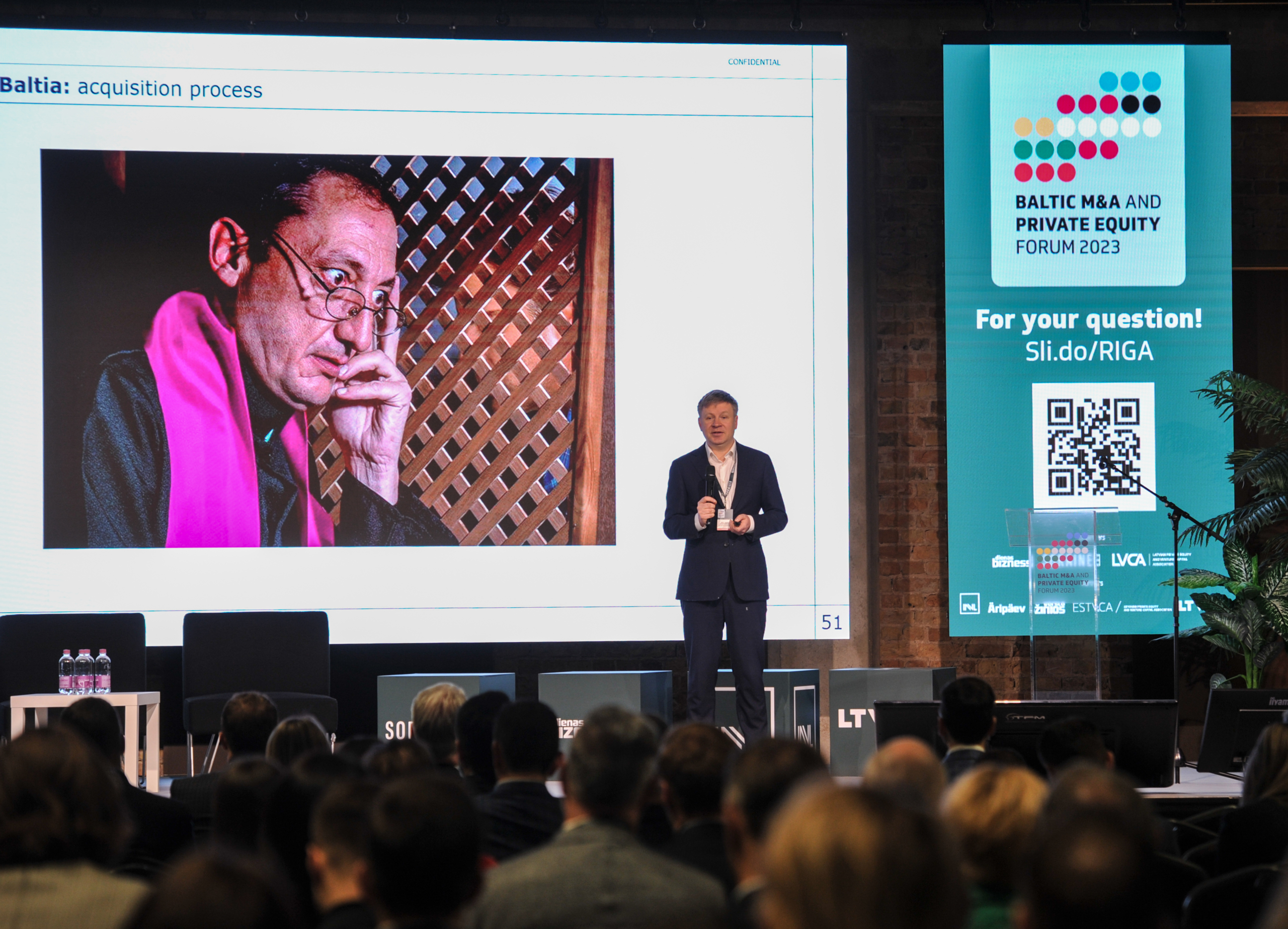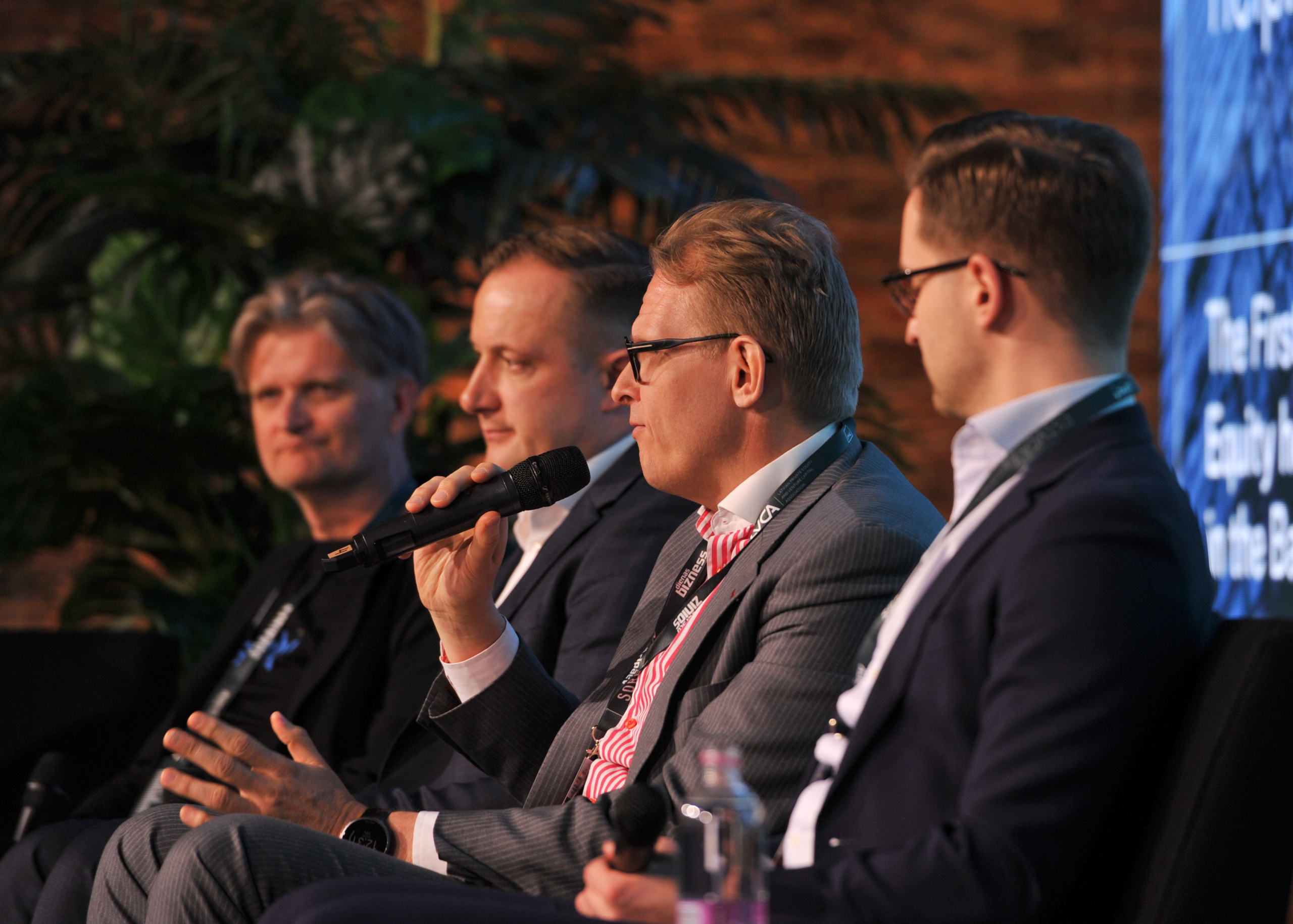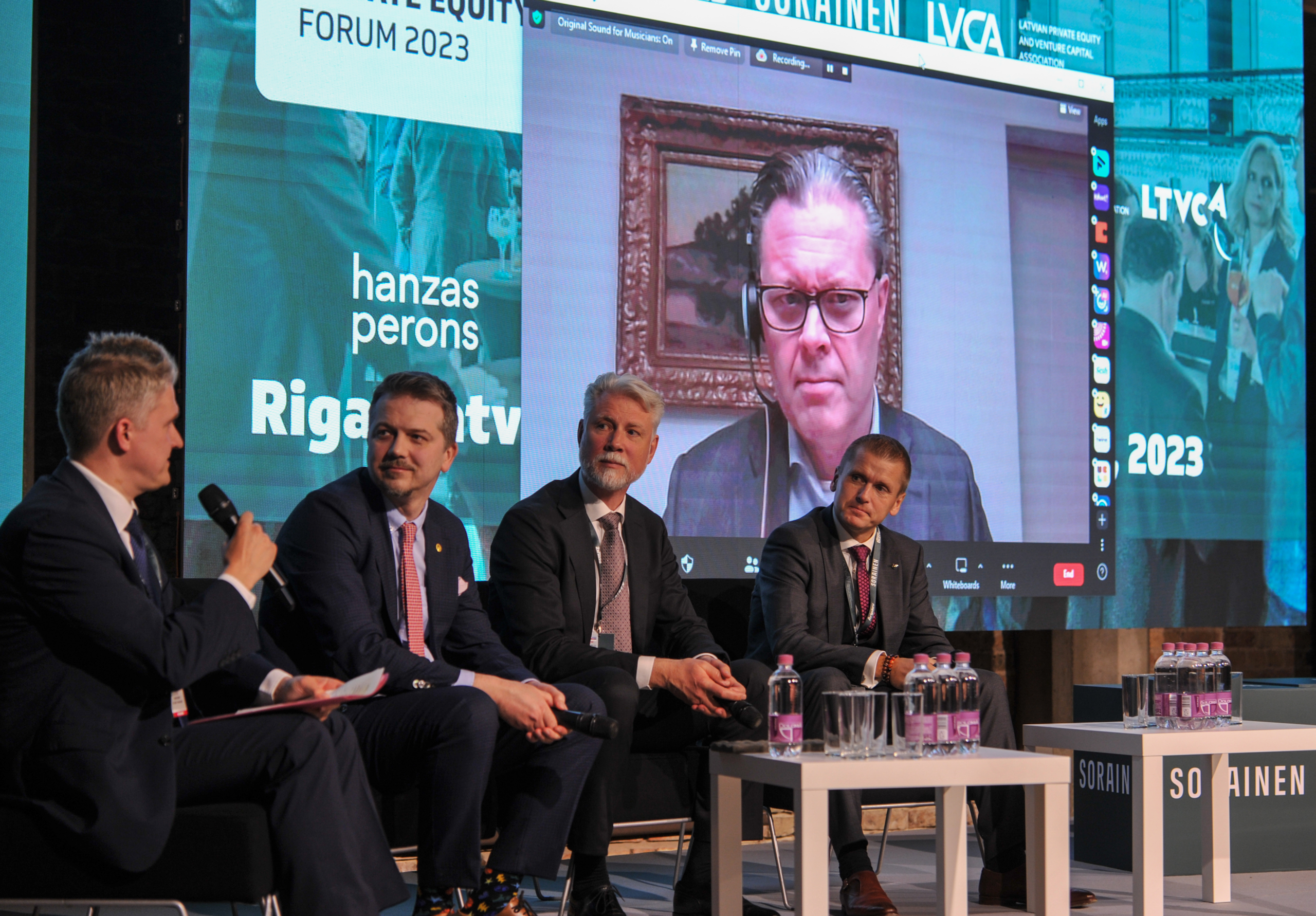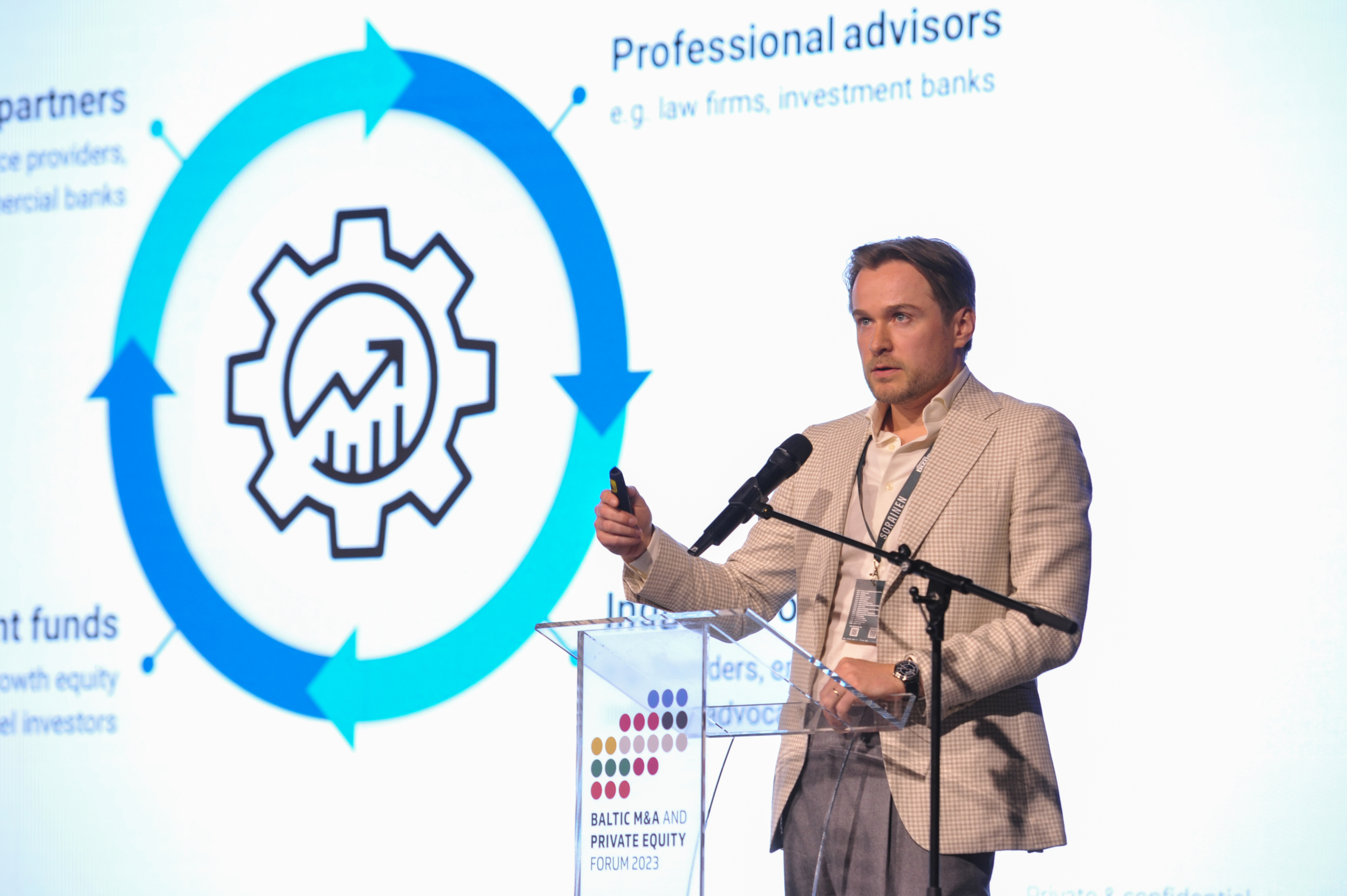The Baltic M&A and Private Equity Forum 2023 was organised by Sorainen in cooperation with leading Latvian business media house Dienas Bizness. The forum, hosted by Sorainen Parner Eva Berlaus, gathered over two hundred participants representing private equity, venture capital funds and investment banking, consultants, lawyers, as well as business executives and owners from the Baltics and beyond.
McKinsey & Company Partner Jussi Hiltunen presented the Global Private Markets Review during the forum, and several sectors were examined by keynote speakers and panels. After the conference, Baltic Deals of the Year received honours. The most notable transactions were carried out by Milrem Robotics and Sunly of Estonia, and Nord Security and Oxylabs of Lithuania.
Growth story: Dealmaker dubbed the Priest
INVL Baltic Sea Growth Fund, the largest Baltic private equity fund, managed to acquire a majority share of Latvian waste management company Eco Baltia after a gruelling two-year process. At the time, the company was the largest PET recycler and exporter in the Baltics, and the second largest privately-owned municipal waste collection business in Latvia. Eco Baltia has since surpassed all investor expectations – revenue has grown 3.4 times since 2019.
A complicated deal
During the acquisition process there were five partners sitting opposite INVL. The European Bank for Reconstruction and Development owned a 30.51% share, Board Chair Māris Simanovičs owned a 16.58% share, and the remaining shares were split between three private sellers. Although the deal originally seemed to be very straight-forward, getting over the finish line proved to be much more difficult than originally anticipated.
“At the end we couldn’t even get all the parties to sit in one room together. I ended up running around from one law office to another trying to get everyone to agree and sign the deal. After spending hours on the phone trying reach a compromise, I got the nickname “the Priest”. We finally closed the deal, and I was back in my hotel room around two in the morning,” explained INVL Asset Management Head of Private Equity Vytautas Plunksnis.

Despite such market shocks as the pandemic, crude oil price crash and historical underinvestment, Eco Baltia has since acquired leading Lithuanian waste collection service Eco Baltia and has signed an agreement to acquire Czech fibre producer Tesil Fibres. “It was hard to verify company data, as the group isn’t listed, but it was still an overall valuable experience. It encourages us even more to look beyond the Baltics for opportunities – we have what it takes! We’re ready to grow more,” says Plunksnis.
Future investment and deals
The market looks promising and INVL has since pursued over thirty M&A projects. The fund hopes to reach EUR 50 million EBDA by 2025. Plastic prices are increasing, cardboard prices are increasing, and the business of cleaning up other people’s mess won’t disappear anytime soon. With robust growth in the recycling sector, helping others reach their sustainability goals has helped Eco Baltia grow and become more sustainable.
VCA panel: Go for fast-growing winners
What drives the Baltic private equity market and where is it going? This was the main topic of discussion for the panel moderated by Baltcap Managing Partner Martin Kõdar. Panellists included Swedbank Investment Management CEO Pēteris Stepiņš, EIF Head of Lower Mid-Market in Northern, Eastern & Southern Europe, Equity Investments Marco Natoli, Willgrow Investment Manager Arvydas Jadevičius, and LVCA Chair and Livonia Partners Founding Kristīne Bērziņa.
Investors cautiously optimistic
Over the past few years Europe has experienced a slowdown in investment spurred on by a cautious approach from investors and exit challenges – and the Baltics are no exception. Considering these factors, the EIF is taking a strategic approach to the region. “We aim to be a stable, analytical investor with a long-term perspective on how European markets should develop. Our main strategic evolution involves placing more emphasis on several EU themes in investments, such as ESG, sustainability, and defending new tech champions,” says Natoli.
Swedbank is a pension fund cornerstone in the Baltics. During ten years of investment management, the bank has seen a lot and learned a lot – especially the importance of a good LPA contract during the fundraising period. “We’ve never seen a fund come to us with single-digit RR. The key is to compare the various alternatives to PE. When comparing markets, it’s always better to compare with emerging markets or US equities – Baltic equity indexes won’t provide a broad enough picture,” says Stepiņš.
Willgrow is a family investment company that always chooses quality over quantity when it comes to investments. “After performing rigorous analysis, we ask ourselves – is this the best possible investment we can make at this moment?” says Jadevičius. He’s also an advocate of moving towards a co-investing model to attract more capital to the region. “We’ve observed that the typical model, where the pendulums swings between the GP and LP, doesn’t always work. Higher returns can be generated by co-investing with a PE company,” says the investment manager.
What to expect
In terms of global and European markets, private equity is currently in a difficult period. This year’s Q1 data shows that PE deal value in Europe is the lowest it’s been in 25 years, but Bērziņa remains bullish on the Baltic market. She has three convictions regarding prospects in the Baltics. First, that there is extreme underinvestment in the region – the Livonia Partners pipeline hasn’t been empty since 2015. Second, the various shocks the market has experienced can be considered a silver lining, if you know how to manage volatility in a cyclical market. Third, it’s important to invest in new companies addressing environmental challenges and climate change, while providing older companies with support and guidance.
Livonia Parners currently manages EUR 240 million in assets invested into Baltic companies. “There is still a gap between sellers and buyers when it comes to price expectations. Prices have also been affected by such factors as energy prices and inflation. This is why we’re not betting on cheap, poorly performing companies – we want fast-growing winners,” says Bērziņa.
Energy outlook: Huge deals coming
Clean energy is widely considered the only way forward, so investments into renewables are becoming increasingly attractive. “The energy transition has just begun,” said Kai Rintala, Managing Director at Taaleri Energia.
Renewables transition
“We think the real business is just starting,” agreed Martin Kruus, Co–founder and Chairman of the Supervisory Board at Sunly. Kruus noted that when entering the renewables business, they were relying on the old system being phased out completely. “The Baltic states combined are importing about a third of the electricity that they need. After we become energy independent, we can move to the next phase – turning fossil fuel green.”
The panel of energy producers and investors predicted increased M&A activity in the energy sector for the upcoming years. Vadim Vladykin, Investment Director at Ignitis Renewables, confirmed that the Baltic market is attractive for investors, even compared to the Nordic countries. Vladykin expects many projects to change hands and a turbulent environment for transactions. “However, deals will take longer, as the spread gets broader,” he added.
Liudas Liutkevicius, Managing Fund Partner at INVL Renewable Energy Fund I, also expects large transactions and big players to enter the Baltics. This process will be further supported by the development of smarter assets, such as battery storage and hydrogen options.

Good returns for Taaleri
Liutkevicius insists that the Baltics is a lovely place to be, but that market size and concentration remain a concern. “Three major companies control the market. It is not that easy to access consumers, and consumers are small. Despite all the green madness, banks require a power purchase agreement. They wish to secure cash flow,” Liutkevicius remarked.
Kai Rintala, Managing Director at Taaleri Energia, noted that Taaleri likes the risk-adjusted returns that the Baltic markets provide. He added that while their EUR 80 million investment in Lithuania makes them a respectable player in the market, a similar investment in Poland means no one notices their existence.
Baltics turn to larger markets
To mitigate the small market risk, renewable energy producer Sunly exercises territorial hedging by doing business in Poland. The country is still dominated by 80% use of fossil fuels. Sunly recently received a EUR 200 million cash injection from Mirova and existing shareholders to further develop capacities in both Poland and the Baltics. Kruus noted that energy firms must work closely with regulators to ensure that the environment is sound for financial investors.
Energy sector M&A is booming globally. While the overall volume of private equity deals declined by 26 percent last year, according to a McKinsey report published in March, energy was the only sector in which deal volumes grew. The sector’s deal volume grew by six percent year over year, following a 102 percent increase in 2021.
Health outlook: New models redefine sector
How will private clinics and new regulations affect the ecosystem? Which innovations and technological developments can ensure development and continuous investment? The various sector challenges and opportunities were discussed by the panel moderated by Sorainen Counsel and Estonian Head of Life Sciences & Healthcare Sector Group Lise-Lotte Lääne. Panellists included Verge HealthTech Fund Managing Partner and Health Founders Co-founder Erki Mölder, Baltcap Investment Director Juris Pārups, and Dimedic Baltic General Manager Dainius Puodžiūnas.
Challenges in financing
Healthcare isn’t the easiest sector to enter as a private actor. “Banks don’t always understand why private companies want to enter the publicly financed healthcare ecosystem – they see a lot of risk, so financing is more scarce compared to other industries. Baltcap wants to close this financing gap, but there is need for broader understanding of the sector,” says Pārups. He adamantly believes that private money can be a force for creating better outcomes for patients.
Mölder backs the concept that the public sector can’t carry the full burden of the medical industry. “Decision making regarding healthcare has to change. We’ve been throwing money into healthcare, but now we’re spending a lot more on defence and the military. The change must be not only technological, but also cultural and legal regarding our way of thinking about healthcare,” says the health fund managing partner.
Healthcare challenges also aren’t only financial, but also legal. “There are many legislative flaws in regard to the healthtech sector. For example, in Lithuania telemedicine is defined as only doctor-to-doctor consultations, so we could be banned from having this term on our website. Most of the rules only restrict services, rather than boost them and implement higher standards,” explained Puodžiūnas.
Future deals
The term healthtech was first mentioned in 2013, so the new industry still has much to define in terms of laws and regulations. There has also been a gradual shift towards the US market, when it comes to new companies. “It used to be that first your register in Europe, then go to the FDA. Now it’s vice versa because it’s so messy in Europe. In the US companies own data – you can sell it, analyse it, do anything you want,” says Mölder. It also usually takes 3-4 more years than average for a healthtech start-up company to mature, as there is always a requirement for clinical proof.
As for what can be expected in the future, everyone remains hopeful. “We see a variety of new models developing for healthcare entities. There is a move toward value-based care,” says Lääne. There may even be a way to reform the sector without eliminating legacy systems by adding technological solutions. According to Mölder, Estonia can gain 10-15% efficiency. In other words, the system can save EUR one million per day. He sees that from the governmental view, there is no other option than private-public partnership.
Defence outlook: hungry for investments
Contrary to widespread belief, the European defence industry is currently thirsty for investment. Financiers have not yet become highly sought-after partners.
“Yes, the political rhetoric in Europe has changed tremendously. There will be investment in the defence sector, but the start-up ecosystem has not changed,” noted Milrem Robotics Founder Kuldar Väärsi. “Many European venture capital funds align their regulations with those of the European Investment Bank (EIB). This means that from a VC perspective, defence industry start-ups are in the same category as gambling and prostitution.”
According to Väärsi, the most crucial step would be to change EIB policy. Such a move would also change the behaviour of venture capital funds and bring more money to start-ups in the European defence sector. Over decades the production base of the European defence industry has shrunk drastically. Even with the various modern conflicts, production remains at peacetime levels, stated Henrik Petersson, Vice Chairman of the ASD Defence Business Unit.
According to Petersson, the defence industry needs the financial sector as a partner to ramp up production. It’s the only way to secure sovereignty and security across Europe. However, the finance sector has instead pushed defence companies away. They’re frequently denied even basic services, such as bank accounts, export insurance or loans. There are various cases where representatives of the European defence sector have found it difficult to rent property or obtain insurance for employees.
Well-performing investment tool
According to Ingvar Pärnamäe, head of Estonian defence start-up Vegvisir, the Baltic defence industry is very well positioned for continuous growth. Local companies are well-trained and can conquer the world. The sector, which had already grown rapidly before the war, is ready to multiply growth statistics once again.
Pärnamäe stated that even if the war in Ukraine were to miraculously end today, the world would continue to be in crisis mode. Many countries would need to replenish and add to their supplies after the amounts given to Ukraine. “If you, as an investor, are looking at defence as a big oil tanker, you know it is about to turn. It is perfect timing to jump aboard and enjoy the smooth sailing afterwards,” Pärnamäe explained. He recommends the defence sector as a sound investment target.
According to producers, the need for Baltic defence companies to obtain access to money is growing. “Many Estonian companies have reached the point where they need investment to fulfil orders. At the same time, it would be a long-term, strategic, sustainable, and forecastable business for investors,” said Pärnamäe. He added that experienced teams can mitigate most of the risks traditionally associated with the defence sector. “Now is the right time to invest in the defence industry,” Kuldar Väärsi confirmed.

Scaling pains
According to defence industry stakeholders, the biggest challenge defence companies face is scaling up. “You can have a marvellous product that sells very well in the B2C market, because customers are buying based on emotions,” said Väärsi. “In defence, decisions are not based on emotions. Companies are assessed solely by asking “Ok, you have a nice prototype – but can you deliver two hundred of these, offer support for 15 years and sustain the defence capability? If the answer is no, this marvellous product is worth nothing on the market.”
Time to add “D” to “ESG”
According to Henrik Petersson, the defence industry faces a disconnect. On the one hand we have political priorities and an increasingly positive public perception, and the view of the defence sector from the ESG perspective on the other hand. It’s time to understand that without security, we cannot talk about sustainability. No contradiction exists between increasing defence investments and following sustainability principles.
Kari Vatanen, Chief Investment Officer at Veritas Pension Insurance Company in Finland, agrees about the need for rethinking the ESG aspect. “We are a responsible investor and have integrated ESG into our investment process. If companies observe good corporate governance practices, we are ready to invest in the defence industry,” he stated. Vatanen, supports current discussions currently in the investment community regarding whether D should be added to the star trio ESG. “I really think Western democracies are required to defend human rights,” he remarked.
Unicorn story: Stick to your guns
The story of Nord Security is a unique story of a bootstrapping start-up, that already achieved world-wide success before embarking on its first investment round. The company started ten years ago with Nord VPN, added another VPN (Surfshark) five years ago, and the two products became number one and two globally. The company began expanding in the B2B and B2C sectors and decided to look for financing. Nord Security Group CFO Laurynas Zabulis shared how the start-up prepared for their first big fundraising round on their journey to becoming the biggest and most successful cybersecurity company in the world.
The fundraising process
- Preparation: This is one of the most important steps. Set your key objectives and work with advisors – preferably ones you’ve worked with before and have a strong record of accomplishment in the industry. Prepare financially so that you can properly relay your story to investors and ensure that your legal structure protects investor money. Create a target investor list and define what really makes your business stand out.
- Network: Partners, professional advisors, industry professionals and advocates – your network is the key to achieving business success. It gives you access to the top echelon of the venture capital industry. Nord Security aimed to attract tier-1 US and EU investors to signal to the market the quality of their business.
- Culture: Having employees that really believe in the goal of the company cannot be understated. Nord Security is the largest tech employers in Lithuania, but it always placed an emphasis on creating a team with a unified goal.

The fundraising round took longer than the company had planned, as there were additional challenges for a company of substantial scale to sort out legal aspects. “The investment round was a marathon, not a sprint. The investors sitting across from us challenged us, but at the same time this helped us understand what’s great about our business. The in-depth analysis required by the fundraising round helped us further develop our strategy,” says Zabulis.
Regional success
Nord Security also experienced unexpected outside challenges. The macroeconomic climate shifted during the fundraising process. At the beginning there was great investment and start-up valuations were increasing very quickly. Once the Russian war in Ukraine escalated capital dried up and investors began dropping out, however the company stuck to their objectives and the round was successful. Zabulis believes this success is good for the region, as it is already attracting more tier-1 investor interest to the region.
Ukraine calls on Baltic peers to launch JVs
The Ukrainian investment community invites Baltic investors to take advantage of the opportunities the country can currently offer. “We believe that Ukraine and its neighbours, including the Baltic countries, will create a big economical cluster in the CEE region,” says Andrey Kolodyuk, board chair of the Ukrainian Venture Capital and Private Equity Association (UVCA). He is also an investor with 20 years of experience under his belt.
Invest in Ukraine
The UVCA invites everyone to join in developing and implementing the Ukraine Redevelopment and Recovery Plan, which was initiated in May 2022. “In order to make use of the opportunity, we need to act now. We have created two coinvestment platforms at the UVCA – one for start-ups and another for scale-ups in real sectors like water and energy supply, health care, food and agro, housing and materials etc where we match projects with possible JV and coinvestment partners. We welcome you to step in and set up joint ventures, bringing along your equipment.” Click here for more info!
Kolodyuk announced that “Ukraine is a one trillion-euro opportunity,” but that it needs to be addressed properly. There needs to be efficiency in allocating funds, good governance, and anti-corruption procedures. Illustrating the scale of the existing business opportunities, he highlighted several IT industry numbers. “Our IT outsourcing sector has grown into a USD 7.5 billion business this year. It grew 8%, despite the blackouts and power cuts. For the first time it’s become the nr.1 export-related industry. This brings hard cash back to Ukraine that finances defence along with the private sector.”
Deals and numbers
The UVCA also operates a USD 300 million Fund of Funds project for start-ups. 17 funds are currently in the process of raising USD 26.4 billion, including five PE funds and 12 VC funds. “Some of our PE funds have already got the first close,” Kolodyuk stated.
The UVCA was established in 2014 and has fifty members. None of them have stopped investing in Ukraine, according to the chairman. “The Ukrainian ecosystem has since built eight unicorns. Two of them were born last summer, with fifty more in the pipeline. It’s not easy, but our ecosystem continues to perform,” Kolodyuk emphasised. Besides fundraising, the UVCA works on many fronts to improve the investment climate. It pushes for important updates in local legislation and European frameworks, signs up major investors, as well as secures war insurance and other incentives for investors.


